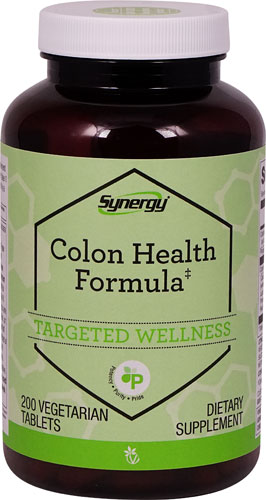[vc_row][vc_column][vc_column_text]As the last stop in the digestive process, your colon is always busy absorbing water, taking up electrolyte minerals and playing host to the trillions of microbes that make up your gut microbiome. Yet you probably never think about all that activity—until something goes wrong.
Uncomfortable digestive symptoms can be a sign of imbalance or digestive disease. But a combination of dietary choices, lifestyle modifications and strategic supplementation can put your colon back on track.

Common colon health problems
According to the National Institute of Diabetes and Digestive and Kidney Diseases (NIDDKD),
between 60 and 70 million people in the U.S. suffer from some kind of digestive condition that affects the colon, including:
Factors that affect colon health
But diseases aren’t the only cause of digestive problems. Your colon is constantly in contact with input from the outside world—including, by one estimate,
nearly 2,000 pounds of food every year, which makes diet one of the most significant factors in colon health. What you eat can support digestive wellness or contribute to conditions like inflammation,
leaky gut and
dysbiosis.
In addition to diet, colon health can also be affected by:
Signs of an unhealthy colon
Whatever the cause, symptoms of colon health problems can range from mild to severe and include:
- Abdominal pain or cramping
- Bloating and gas
- Constipation
- Diarrhea
- Nausea or vomiting
If your symptoms are associated with an illness like gastroenteritis ("stomach flu"), they should go away after a few days. Persistent or chronic symptoms may indicate a more significant underlying condition and should be evaluated by your doctor.
When to see a doctor for colon health
Some symptoms can be signs of serious digestive conditions. See your doctor right away if you experience any of the following:
- Sudden changes in stool size
- Uncontrollable or chronic diarrhea
- Urgency or bowel incontinence
- Unexplained weight loss
- A feeling that your bowels don't empty completely
- Dark or tarry stools, which may indicate bleeding
- Visible blood in your stool
Your doctor will perform diagnostic tests and suggest appropriate treatment based on the results.
When to start colon cancer screening
Even if you don't have any digestive symptoms, the
CDC recommends starting regular colon cancer screening at age 45. Screening options include stool tests, virtual colonoscopy and traditional colonoscopy and are performed every one to 10 years.
Your doctor may recommend early screening if you have
risk factors like:
- IBD, since inflammation can cause changes to the cells that line your colon
- A family history of colon cancer
- Certain genetic conditions
Routine colon cancer screening typically continues until age 75, after which it may be performed on an as-needed basis.
3 Tips for Better Colon Health
Fortunately, many common digestive symptoms aren't serious and can be addressed with simple diet and lifestyle changes. Here are three ways to keep your colon healthy and happy.
1. Eat more whole plant foods
Research shows that diets emphasizing
whole and minimally processed plant foods promote overall colon health. Some foods may offer particular benefits, including:
- Whole grains, beans, nuts and seeds, which contain compounds called phytates. Phytates may help prevent free radical damage that can contribute to inflammation.
- Cooked and cooled pasta or potatoes provide resistant starch, a type of fiber shown to cause favorable changes in the gut microbiome. Cooling these foods before eating increases the resistant starch content. (It's okay to heat them back up if you don't like cold food!)
- Dates may increase the production of short-chain fatty acids, which help maintain a healthy gut lining and may prevent leaky gut. Dates also appear to support cell health by regulating factors involved in DNA damage.
- Fermented foods like raw sauerkraut, low-sugar kombucha and plain yogurt contain probiotics that can support gut health.
2. Remove or reduce meat and junk food
Studies indicate that many foods common to standard Western diets may increase your risk of colon diseases and should be avoided:
- High meat consumption. Eating a lot of meat, including red and processed meat, can increase numbers of protein-fermenting gut microbes. This may lead to higher production of ammonia, which can be toxic, and hydrogen sulfide, which is associated with the development of ulcerative colitis.
- Sugar and artificial sweeteners. Added sugars and calorie-free sweeteners can trigger inflammation, promote the growth of pathogenic bacteria and reduce production of the protective mucus that lines the colon.
- Ultra-processed foods. The combination of sat, sugar, fat and additives in highly refined foods may be linked to inflammation and changes in the microbiome. Diets high in these foods may damage the gut barrier and increase the risk of leaky gut.
If you suffer from IBS or IBD, you might need to avoid other foods to minimize irritation or inflammation. Ask your doctor if dietary patterns like low FODMAP or the Specific Carbohydrate Diet (SCD) may help your symptoms.
3. Clean up your lifestyle
Along with dietary choices, these lifestyle changes can provide additional support for colon health by limiting irritants and promoting a balanced microbiome:
- Exercise may reduce inflammation and oxidative stress, help your body remove damaged cells and support tissue regeneration, which could promote a strong gut barrier and prevent leaky gut.
- Stress reduction can minimize inflammation and restore vagus nerve function. Since it's involved in regulating gut muscle function, a healthier vagus nerve can mean fewer unpleasant symptoms.
- Quitting smoking reduces your exposure to hundreds of chemicals that can cause free radical damage and inflammation throughout your body, including your gut. (Your lungs will thank you, too!)
- Limiting alcohol consumption can soothe irritated digestive tissues and reduce the risk of dysbiosis and leaky gut.
- Adequate sleep appears to support antioxidant activity, which can help control inflammation. Getting the recommended seven or more hours of sleep per night may also improve the body's ability to repair damage in the gut, although this hasn't been tested in humans.
Can supplements support colon health?
Some supplements may provide additional
colon health support when combined with a healthy diet and lifestyle:
- Probiotics have been shown to provide support for temporary digestive issues such as diarrhea and constipation, particularly in cases associated with antibiotic use.†
- L-glutamine may play a role in supporting cellular health in the gut, which can help support a healthy colon wall.†
- Zinc carnosine may support the mucosal barrier and help maintain a healthy gut membrane.†
- Deglycyrrhizinated licorice coats and soothes the digestive tract and may support the production of the colon's protective mucus layer. Other soothing herbs include slippery elm and marshmallow root.†
- Quercetin may help protect colon cells from free radical damage and promote a healthy gut barrier.†
- Magnesium and psyllium husks can both promote healthy bowel function and may help with constipation. Psyllium draws water into stool to create bulk, and magnesium helps support normal muscle relaxation, potentially helping to make stool easier to pass.†
- Herbs like chamomile, fennel, lemon palm, peppermint and ginger are associated with digestive health and may be helpful if for temporary bloating, gas or abdominal pain.†
Note that some supplements may not be suitable for certain conditions and may interact with other medications you take. Consult a doctor or other qualified health professional before starting a new supplement.
Top takeaways for a happy colon
- Digestive diseases that disrupt colon health are common and include irritable bowel syndrome (IBS), inflammatory bowel disease (IBD), diverticular disease and colon cancer.
- Common symptoms of colon health problems include constipation, diarrhea, cramping, bloating and gas.
- Severe symptoms include unexplained weight loss, changes in stool size or frequency, bowl incontinence and bloody stools. See your doctor immediately if you develop any of these symptoms.
- Colon health may be affected by diet, illness, stress, obesity, exercise, medications, hormone changes and age.
- The best foods for colon health include fruits, vegetables, whole grains, beans, nuts, seeds, fermented foods like sauerkraut and cooked and cooled pasta and potatoes. Avoid ultra-processed foods, excessive meat intake and alcohol.
- Lifestyle changes can promote colon health. Try exercising, reducing stress, getting adequate sleep and quitting smoking.
- Some supplements, such as probiotics, l-glutamine and soothing herbs, may provide additional colon health support.†
- The CDC recommends routine colon cancer screening beginning at age 45.
†These statements have not been approved by the Food and Drug Administration. These products are not intended to diagnose, treat, cure or prevent disease.
[/vc_column_text][/vc_column][/vc_row][vc_row][vc_column][vc_text_separator title="Featured Products" border_width="2"][vc_row_inner equal_height="yes" content_placement="middle" gap="35"][vc_column_inner width="1/3"][vc_single_image image="174036" img_size="full" alignment="center" onclick="custom_link" img_link_target="_blank" css=".vc_custom_1711817208652{padding-right: 7% !important;padding-left: 7% !important;}" link="https://www.vitacost.com/vitacost-synergy-colon-health-formula"][/vc_column_inner][vc_column_inner width="1/3"][vc_single_image image="174039" img_size="full" alignment="center" onclick="custom_link" img_link_target="_blank" css=".vc_custom_1711817226876{padding-right: 7% !important;padding-left: 7% !important;}" link="https://www.vitacost.com/renew-life-probiotic-colon-care-probiotic-capsules"][/vc_column_inner][vc_column_inner width="1/3"][vc_single_image image="174038" img_size="full" alignment="center" onclick="custom_link" img_link_target="_blank" css=".vc_custom_1711817243296{padding-right: 7% !important;padding-left: 7% !important;}" link="https://www.vitacost.com/zahler-colon-cleanse-powder-10-day-detox-digestive-intestinal-health-support"][/vc_column_inner][/vc_row_inner][/vc_column][/vc_row]




